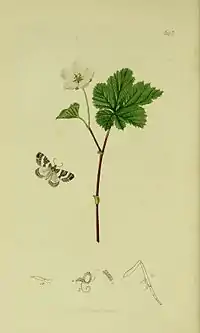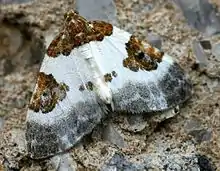Plemyria rubiginata
Plemyria rubiginata, the blue-bordered carpet, is a moth of the family Geometridae found in Asia and Europe. The moth was first described by the Austrian lepidopterists Michael Denis and Ignaz Schiffermüller in 1775.

| Blue-bordered carpet | |
|---|---|
 | |
| Scientific classification | |
| Kingdom: | |
| Phylum: | |
| Class: | |
| Order: | |
| Family: | |
| Tribe: | |
| Genus: | |
| Species: | P. rubiginata |
| Binomial name | |
| Plemyria rubiginata (Denis & Schiffermüller, 1775) | |
| Synonyms | |
| |
Description
The wingspan is 22–28 mm. The ground colour of the forewings is milky white. The basal field is light brown to black brown. A large light brown to black-brown stain on the costa near the centre stands out. The intensity and shape of this spot can vary. From the apex area runs a blue-grey marginal band which continues on the hindwings usually in an attenuated form. A thin white squiggly line is visible in this band. The forewings and hindwings each show a black discal fleck, which can be sometimes be very unclear. "White, more glossy than in any succeeding species of the group, yet more thinly scaled than ocellata. Forewing with brown basal patch and anterior half of median band, both wings with more or less well-defined bluish-smoky distal border. — ab. parvula Retz. has, in addition a dark spot at the middle of the hindmargin of the forewing. — In ab. guttata Huene the median band is reduced to a mere spot surrounding the discal dot. — plumbata Curt. is a race which inhabits Scotland and the North of England. The median band is uninterrupted, or only very narrowly interrupted and the smoky dark bordering is usually intensified. Sometimes also there are traces of a narrow smoky band midway between the basal and median patches. — ab. fumosa Prout is an extreme aberration, not infrequent among the race plumbata, in which the ground-colour of the forewing is in part or wholly suffused with smoke-colour, sometimes so deeply as almost entirely to obliterate the markings. Hindwing also sometimes infuscated. — maritima Strand is given as a Norwegian race, smaller than the type, with the marginal band of the forewing black-grey, not or scarcely interrupted, etc. — dahurica Stgr. from Dauria and Japan, is yellowish white, with the basal and costal patches light brown, the dark borders weak.[1]
The moth flies from June to the beginning of September and the species overwinters as an egg in the fork of a twig..[2]
Larvae can be found from April to June and are easily beaten from the foodplant by day.[3]
They feed on many kinds of trees and bushes, including alder (Alnus glutinosa), blackthorn (Prunus spinosa), birches (Betula species), hawthorn (Crataegus monogyna), plum (Prunus domestica) and apple (Malus domestica).[4]
Preferred habit are areas of hedges, forests, orchards and gardens.
Subspecies
Distribution
The distribution area extends through western and central Europe including the British Isles, and continues through the temperate zone of the Palearctic to the Russian Far East Siberia and Japan. It rises to an elevation of 1500 metres in the Alps.
Notes
- ^ The flight season refers to Belgium and the Netherlands. This may vary in other parts of the range.
References
- Prout, L. B. 1912–16. Geometridae. In A. Seitz (ed.) The Macrolepidoptera of the World. The Palaearctic Geometridae, 4. 479 pp. Alfred Kernen, Stuttgart.
- "Blue-bordered Carpet Plemyria rubiginata". Butterfly Conservation. Retrieved 14 January 2021.
- Porter, Jim (1997). The Colour Identification Guide to Caterpillars of the British Isles. London: Viking. p. 40. ISBN 0 670 87509 0.
- Kimber, Ian. "Blue-bordered Carpet Plemyria rubiginata". UKmoths. Retrieved 14 January 2021.
External links
- Lepiforum e.V.
- De Vlinderstichting (in Dutch)